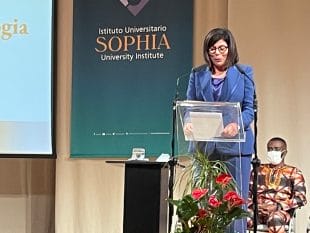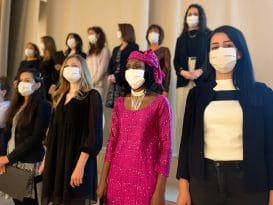New academic year of the University Institute inaugurated in Focolare’s little town of Loppiano (Italy) with integral ecology and its implications for the university being the central theme. The Sophia University Institute has one ambition: to reintroduce the pedagogical model used by Greek philosophers before Christ, like Gymnasium or Lyceum, into the university system where coexistence between teachers and students formed the fundamental educational impetus, but adding Christian values of the person and communion. This is no mean feat in a place of research and “integral ecology”. As Federico Rovea, a former student of Sophia, now a teacher, said: “Sophia means doing university, seeking the truth in an atmosphere of friendship”. This was experienced on 29 October 2021, at the Sophia University Institute in Loppiano (Italy), during the inauguration ceremony of the 2021-2022 academic year. Theme: “What are the implications for the university in an age of integral ecology?”.  The President of the Focolare Movement, Margaret Karram, who is vice-grand chancellor of the Institute, reiterated in her address that “the objectives that Sophia proposes are high and engaging. They require everyone to give the best of themselves in a continuous openness to dialogue and listening, a place where intellectual commitment always looks for new ways to respond to the cultural needs of our time”. Speaking with some emotion the new rector, Giuseppe Argiolas, recalled the great challenges linked to the pandemic: “We have accomplished what in the past we imagined we would do over several years: 1) complete the 2019/20 academic year via Internet; 2) create the conditions for a high-level offer, with a professional platform; 3) offer a specific diploma for those who would like to study at Sophia but don’t have the means to come to Loppiano. This is Sophia Web Academy: Culture of Unity and Leadership through dialogue”.
The President of the Focolare Movement, Margaret Karram, who is vice-grand chancellor of the Institute, reiterated in her address that “the objectives that Sophia proposes are high and engaging. They require everyone to give the best of themselves in a continuous openness to dialogue and listening, a place where intellectual commitment always looks for new ways to respond to the cultural needs of our time”. Speaking with some emotion the new rector, Giuseppe Argiolas, recalled the great challenges linked to the pandemic: “We have accomplished what in the past we imagined we would do over several years: 1) complete the 2019/20 academic year via Internet; 2) create the conditions for a high-level offer, with a professional platform; 3) offer a specific diploma for those who would like to study at Sophia but don’t have the means to come to Loppiano. This is Sophia Web Academy: Culture of Unity and Leadership through dialogue”.  In a well-received speech, Valeria Garré, representing the students, emphasised three words: journey, commitment and openness: “Sophia is my home every time I realise that ecology is truly integral, also when it is not easy, and includes relationship, care for our environment and being faithful to completing a task”. Finally, Cardinal Giuseppe Betori, Archbishop of Florence (Italy) and Grand Chancellor of Sophia, focused on the meeting due to take place in February in Florence of a number of Bishops and Mayors from Mediterranean countries. “Our Churches feel the need to rediscover their own identity. Starting from the fact that we have the Mediterranean in common, every local Church and every government can adopt an attitude of listening to and welcoming the cry of humanity without being afraid of recognising the cry of Christ, his ‘Why?’ in this cry which has a political, religious, social, cultural, economic and ecological nature, a cry also for health, food and water”. The focus of the ceremony was therefore integral ecology. Professor Sergio Rondinara wanted to take up the ecological challenge by linking it to a deeper and more invasive anthropological challenge: “In the recent past the relationship between humanity and nature was balanced and often collaborative (we need only think of the agricultural and farming society). Today it has taken on a critical configuration which we commonly call the ‘environmental crisis’”. He explained how to get out of such a crisis, working on four levels: “the cultural anthropological level, the level of thought, the ethical level and the religious level, all pathways on a personal and social educational journey”. In the discussion, Prof. Mario Taccolini, from the Catholic University of Milan (Italy), highlighted his university’s experience of focusing on the need for an integral ecology, while Prof. Stefania Papa, from the Vanvitelli University of Campania (Italy), emphasised the need for university programmes to be driven by this vital culture. What remains is the conviction that integral ecology is not just a scientific or political objective, but a way of “being in the world”.
In a well-received speech, Valeria Garré, representing the students, emphasised three words: journey, commitment and openness: “Sophia is my home every time I realise that ecology is truly integral, also when it is not easy, and includes relationship, care for our environment and being faithful to completing a task”. Finally, Cardinal Giuseppe Betori, Archbishop of Florence (Italy) and Grand Chancellor of Sophia, focused on the meeting due to take place in February in Florence of a number of Bishops and Mayors from Mediterranean countries. “Our Churches feel the need to rediscover their own identity. Starting from the fact that we have the Mediterranean in common, every local Church and every government can adopt an attitude of listening to and welcoming the cry of humanity without being afraid of recognising the cry of Christ, his ‘Why?’ in this cry which has a political, religious, social, cultural, economic and ecological nature, a cry also for health, food and water”. The focus of the ceremony was therefore integral ecology. Professor Sergio Rondinara wanted to take up the ecological challenge by linking it to a deeper and more invasive anthropological challenge: “In the recent past the relationship between humanity and nature was balanced and often collaborative (we need only think of the agricultural and farming society). Today it has taken on a critical configuration which we commonly call the ‘environmental crisis’”. He explained how to get out of such a crisis, working on four levels: “the cultural anthropological level, the level of thought, the ethical level and the religious level, all pathways on a personal and social educational journey”. In the discussion, Prof. Mario Taccolini, from the Catholic University of Milan (Italy), highlighted his university’s experience of focusing on the need for an integral ecology, while Prof. Stefania Papa, from the Vanvitelli University of Campania (Italy), emphasised the need for university programmes to be driven by this vital culture. What remains is the conviction that integral ecology is not just a scientific or political objective, but a way of “being in the world”.
Michele Zanzucchi




0 Comments